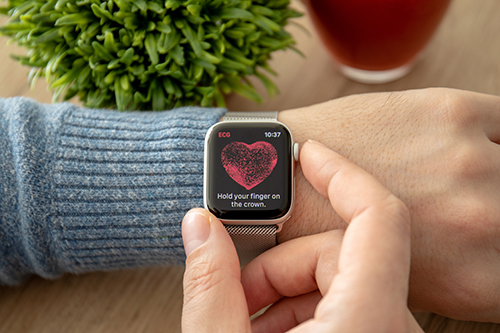For a vast majority of individuals, there’s not a day that goes by without them connecting to their technological devices, especially smartwatches. One reason people buy and use a smartwatch is to keep better track of their health. There are countless smartwatch apps that help individuals keep/set health-related goals and track their progress. Smartwatches can track steps, track foods/meals, monitor sleep, and much more. These apps can be life-changing because they encourage people to take control of their own health in a fast-paced society.
One app, which is approved by the Food and Drug Administration (FDA), has made possible for people to track their own heart health. The electrocardiogram (ECG) app. This app can detect low heart rate and irregular heart rhythms with special sensors on the smartwatch. These sensors measure changes in blood flow through an individual’s skin. Irregular heart rhythms, also known as atrial fibrillation (AFib), is the most common type of heart arrhythmia. AFib often leads to heart-related complications such as blood clots, heart failure, and stroke. “Nearly 30 percent of people with AFib” go undiagnosed, which makes the need for early detection necessary.
What is atrial fibrillation (AFib)?
It’s a heart rhythm disorder that causes a rapid, irregular heartbeat. These bouts occur for occasional, brief periods or much longer. High blood pressure, diabetes, and obesity also increase the odds of having AFib.
What are AFib symptoms?
- Shortness of breath
- Fatigue
- Dizziness
At this time, the Apple Watch Series 4 model is the only smartwatch to provide the ECG app. However, there are other smartwatch companies awaiting approval from the FDA. It’s important for people using a smartwatch to keep in mind that they should not self-diagnose. Users of the app should still consult with a qualified healthcare professional if they feel their measurements are concerning or abnormal.
Find a Carson Tahoe Cardiologist Here







